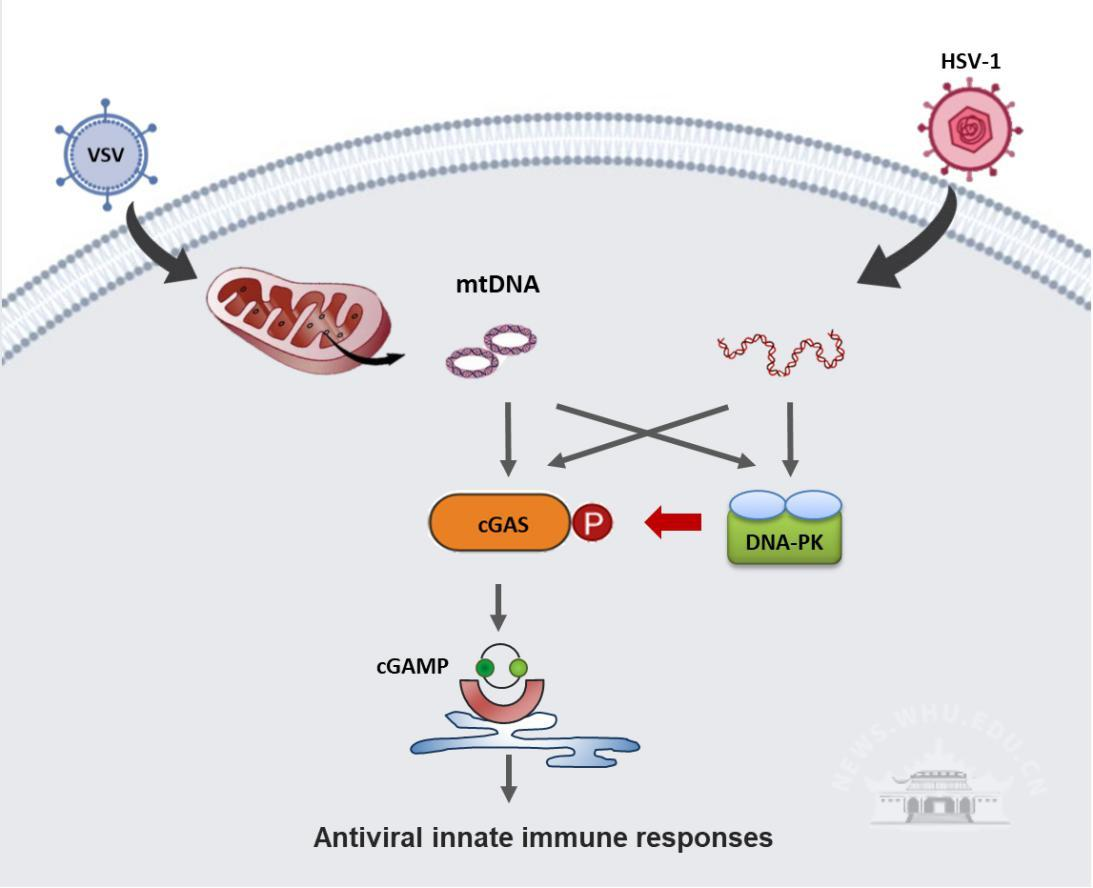On December 3, the international academic journal Nature Communications published online an article entitled DNA-PK Deficiency Potentiates cGAS-Mediated Antiviral Innate Immunity, which is the latest finding of Prof. Zhang Junjie’s team (Frontier Science Center for Immunology and Metabolism, Medical Research Institute, Wuhan University School of Medicine). Their research elucidates the important role of DNA-PK (the DNA-dependent protein kinase) in antiviral innate immune and autoimmune diseases.

Innate immunity is the first line of host defense against invading pathogens, among which cGAS is the pivotal sensor eliciting antiviral innate immune responses in detecting DNA stimulator in the cytoplasm. A serises of studies have shown that cGAS plays a critical role in several autoimmune diseases as well. The DNA-dependent protein kinase (DNA-PK) plays a significant part in DNA damage and repair. Mutation in the gene encoding DNA-PKcs (PRKDC) leads to severe combined immunodeficiency (SCID) in patients due to V(D)J recombination defect. Most patients with DNA-PKcs mutations, nevertheless, also suffer from autoimmune diseases due to overactivated innate immunity. At present, the function of DNA-PK in antiviral innate immune and autoimmune diseases remains not well defined.
Zhang Junjie’s group found that both cells treated with specific inhibitor of DNA-PK and cells with respective genes knocked down can restrict the replication of vesicular stomatitis virus (VSV) and HSV-1, initiating a stronger antiviral innate immune response. The further study found that DNA-PK inhibits the activity of cGAS and antiviral immune response through phosphorylating cGAS. Mice treated with inhibitor of DNA-PK generated potentiated antiviral innate immune response, better restricting VSV and HSV-1 replication. The primary lung fibroblasts of SCID mice and fibroblasts of patients with DNA-PKcs mutations showed significantly higher expression of the antiviral genes. Antiviral innate immune response was potentiated and viral replication was greatly reduced after the cells were infected with HSV-1 and VSV. Those experiments indicated that DNA-PK restricts cGAS-mediated antiviral innate immune response. The results also pointed out that DNA-PK inhibitor may have broad-spectrum antiviral activity and could treat the autoimmune diseases of patients with DNA-PKcs mutations through inhibition of cGAS-MITA signaling pathway.
The article has Prof. Zhang Junjie named as the corresponding author, and Sun Xiaona (PhD student of the class of 2020 from Medical Research Institute) as the first author. Prof. Feng Pinghui (University of Southern California) is the co-corresponding author due to his important contributions to the study. The co-first authors are two doctoral students Liu Ting and Zhao Jun. The research has received support from Academician Shu Hongbing’s research group, and is funded by Double First-class University Construction Funds for Wuhan University, National Natural Science Foundation of China and Independent Science Research Projects of Wuhan University and State Key Laboratory of Virology.
Written by: Zhao Jun
Rewritten by: Shen Yutian
Edited by: Zhu Tong and Hu Sijia